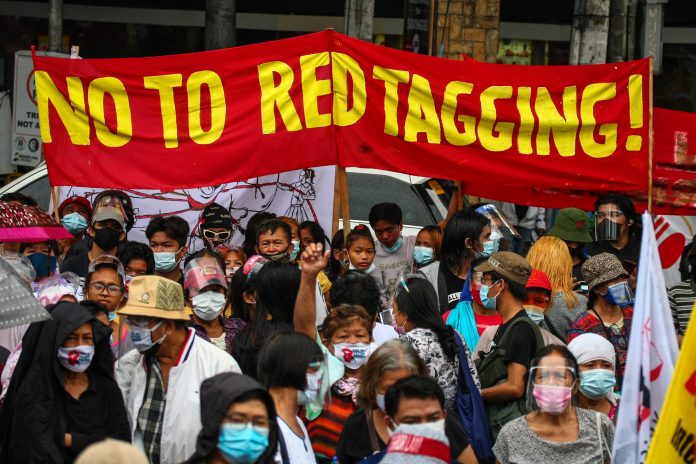Philippine authorities are allegedly misusing terrorism-financing laws to target civil society groups and activists in an apparent bid to be removed from the Financial Action Task Force’s (FATF) “grey list,” Human Rights Watch (HRW) said.
The allegations come as the FATF, a global financial watchdog, recently concluded an on-site assessment in the country to determine if it has met the criteria for removal from increased monitoring.
HRW accused the Philippine government of ramping up terrorism-financing prosecutions against activists, non-governmental organizations (NGOs), and humanitarian groups under questionable circumstances.
“Philippine authorities appear to be stepping up terrorism financing prosecutions to get off of FATF’s ‘grey list’ and its potential financial cost,” said Bryony Lau, deputy Asia director at Human Rights Watch. “This seems to be the government’s latest bad reason to bring baseless charges against civil society groups and activists in violation of their rights.”
The FATF, established in 1989, works with regional organizations and member countries to combat money laundering and terrorism financing.
The Philippines, a member of the Asia/Pacific Group on Money Laundering, was placed on the FATF’s grey list in 2021 due to deficiencies in its counter-terrorism financing measures.
To be removed from the list, the country must implement key reforms, including demonstrating an increase in terrorism-financing cases without impeding legitimate nonprofit activity.
However, HRW warned that the Philippine government is using terrorism-financing laws to target critics rather than legitimate terrorist threats.
Among the groups affected is the Community Empowerment and Resource Network (Cernet), a humanitarian organization based in Cebu province. In May 2024, the Department of Justice filed terrorism-financing charges against Cernet and 27 staff members, leading the Anti-Money Laundering Council to freeze their bank accounts.
A Cernet employee said the case was based entirely on a single unverified allegation that the group had provided funds to the New People’s Army in 2012.
Other organizations, including Kaduami and the Paghidaet sa Kauswagan Development Group (PDG), have faced similar charges.
In October 2024, police charged three Kaduami officials with terrorism financing, prompting the organization to file a complaint stating that the accusations were politically motivated and intended to satisfy FATF’s compliance requirements.
In January 2025, two PDG community workers in the Negros region were arrested on terrorism-financing charges, which Amnesty International reported were based on the testimony of a former Communist Party member.
HRW noted that Philippine authorities frequently rely on testimonies from alleged former rebels, the same type of evidence that has been used in politically motivated prosecutions of activists, religious workers, and journalists.
This practice has been widely criticized as part of the government’s broader “red-tagging” campaign, which accuses individuals and groups of communist insurgency ties.
The National Union of Peoples’ Lawyers (NUPL) condemned the use of terror laws against activists, accusing the Justice Department of “weaponization of terror laws to unjustly target activists and civil society organizations” under the guise of FATF compliance.
In August 2024, United Nations human rights experts also raised concerns, emphasizing that any counter-terrorism measures must adhere to international legal standards of proportionality, necessity, and non-discrimination.
While Philippine authorities have successfully prosecuted some terrorism-financing cases, including individuals allegedly linked to extremist groups in the southern Philippines, many charges against civil society groups have been dismissed by the courts.
Activists such as Fritz Labiano, Paul Tagle, and Jazmin Jerusalem were recently cleared of terrorism-financing accusations due to lack of probable cause. However, HRW warned that the disruption caused by such charges has already harmed NGOs, with Cernet holding up operations and Kaduami officials fearing imminent asset freezes.
HRW urged FATF and its regional partners, particularly Australia, which provides technical assistance to the Philippines on terrorism financing, to ensure that counter-terrorism measures are proportionate to actual risks.
The watchdog emphasized that FATF’s Recommendation 8 explicitly calls for engagement with nonprofits in managing terrorism-financing risks. Philippine activists, however, told HRW that neither the government nor FATF had consulted them during risk assessments.
“FATF should not stay silent while the government is misusing its terrorism financing recommendations to harass civil society groups and activists,” Lau said. “The task force has genuine concerns about terrorism financing in the Philippines, and it should urge the government to address these issues while respecting international human rights law.”









